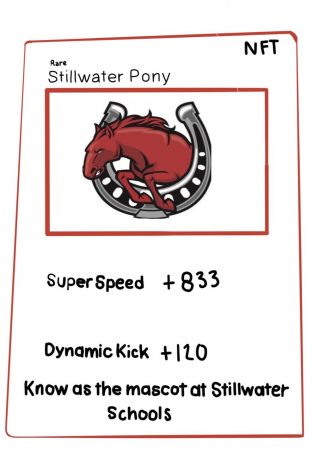Trading card market explodes during pandemic
April 25, 2021

Over the past year, many forms of trading cards have seen gigantic increases in sales and value. One example of this increased popularity is eBay, whose sales of soccer and basketball cards have gone up 1586% and 373% respectively.
Justin Broadwater, the owner of A Rising Star trading card store, was unable to move soccer cards off his shelf in 2017.
“Last year a customer told me to get a soccer product, this year it exploded and I’ve tried to ride the wave,” Broadwater explained.
In the trading card game Pokemon, card value used to be based on how strong or weak a given card was in competition. Now, a card can inflate to prices past seven digits based on popularity or rarity alone.
Junior Alex Gardner recently got back into card collecting and found the market much different than he left it. Prices used to be based on basically how competitive a card was but because there are no playing tournaments being held, the market blew up around collectors.
Purchasing a card worth millions of dollars is not without its own unique set of risks. Physically, cards are very fragile and need to be stored in air-tight containers to protect their condition, however, this is not the only risk to their value.
“As far as modern cards go, they’re way bigger risks because they can reprint stuff,” Gardner explained. “They wait three years, the value might still be super high, but then they decide to reprint it.”
With prices as high as they have ever been, the intended market for trading cards (ages 13+) has struggled to get in on the action. Store shelves can be cleared within hours of being restocked, making it hard for the casual collector.
“Unfortunately the market is pricing out kids right now. I’ve seen grandparents and kids upset because you can’t simply buy a $5 pack of cards on the shelf anymore,” Broadwater explained.
COVID-19 has also played a role in the recent trading card market boom. People looking for a side hustle or who are just plain bored have taken up card reselling as a quick way to make money during the pandemic.
Broadwater believes COVID-19 has been the biggest factor in the trading card market boom.
“Fan’s are not buying the season tickets and aren’t going to these games so where are they supposed to go to get their fan rush in? Some turned to cards and that has exploded,” Broadwater clarified.
Because the trading card market is currently in a bubble, many collectors have been pushed out of the hobby. Unless demand continues to increase, prices are sure to come down eventually but the exact date is anyone’s guess.
“The bubbles are going to pop, when? Who knows. I just don’t foresee the prices, sustaining themselves, especially when you know when the vaccinations start coming in for COVID. People will go back to the daily grind and begin to forget about trading cards again,” Broadwater explained.











